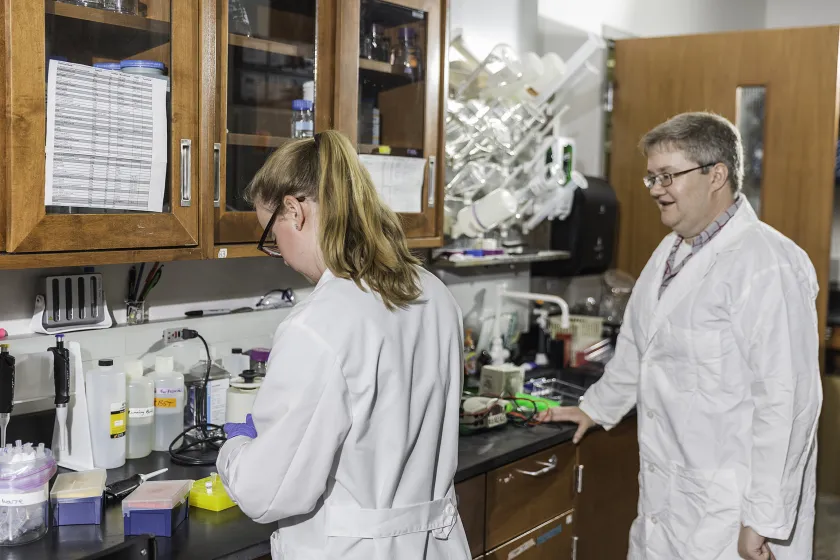Northern Michigan University Biology Professor Josh Sharp and students in his lab are monitoring Marquette wastewater for COVID-19, applying the same methods they have used to test local beach water for E. coli. They are participating in a statewide, $10 million grant-funded pilot program in which local public health departments are coordinating with universities and other entities on COVID-19 wastewater testing programs, which could be an early warning system for virus spread or outbreaks.
The Michigan Department of Environment, Great Lakes and Energy (EGLE) and the Michigan Department of Health and Human Services provided the grant funding for the program to establish a standardized and coordinated network of monitoring systems.
EGLE reports that testing wastewater for viruses, such as the SARS-CoV-2 virus that causes COVID-19, can be an effective tool for monitoring transmission of COVID-19 within a local community or at individual facilities. The virus is shed in human waste, including from people who are not ill or have not yet become ill. The virus can be detected by testing samples taken from sewers and wastewater treatment plants, with results often being available earlier than human clinical samples. These results can inform local public health actions to prevent further spread within that community.
Michigan is leveraging its existing network of laboratories, including NMU's, involved in monitoring the state's beaches for E. coli. These labs are equipped to test for viruses like the SARS-CoV-2 virus that causes COVID-19 and are capable of supporting local wastewater testing efforts.
For both testing applications, Sharp relies on real-time Polymerase Chain Reaction (PCR), a molecular microbiology technique that amplifies targeted DNA molecules.
“All PCR requires is that you have a unique gene sequence you can amplify,” Sharp said. “It doesn't matter what organism it is, you can tailor PCR to detect whichever one you're interested in. So it's just a matter of adapting it for COVID-19.”
Sharp said PCR's effectiveness was demonstrated recently in East Lansing. The technology was able to detect COVID-19 in the wastewater at Michigan State University about five days before there were reports of a spike in cases tied to a local restaurant and brew pub.
“It can give you an early warning of what's potentially going on; a snapshot of what's happening in a community,” Sharp said. “Depending on where you sample from the sewer, you can localize it. In Marquette, we'll take it from the wastewater treatment plant for a snapshot of the city as a whole. There's also the potential to sample from various stations that service different areas of city, or even campus specifically.”
Sharp was first recruited to assist with the beach water monitoring project and has used PCR in that capacity to detect E. coli, an organism found in animal and human fecal material. He said high E. coli levels could signal the presence of more serious infectious agents also found in fecal matter, such as hepatitis and norovirus, which would likely require beaches to close.
In E. coli monitoring, water samples are collected and taken to Sharp's campus lab, where they are pulled through a filter that captures all of the bacteria. DNA is extracted from the filter and there are probes specifically for E. coli. Those are put into the PCR instrument to see if the E. coli DNA can be amplified.
“Adapting this process to COVID-19 requires a little more work because the virus is a lot smaller than a bacteria,” Sharp said. “There's some special filtration that has to happen first. After that, the process is very similar. We just swap out probes for E. coli with probes for COVID-19.”
After Sharp became involved in the beach water project, a staff member at EGLE contacted him about potentially continuing a similar COVID-19 monitoring project.
“Students are able to utilize a PCR machine that monitors fluorescencewhen DNA is amplified in real time,” Sharp said. “This skill set can be applied to many different fields and applications.”
Sharp said the state funding for the COVID monitoring project enabled NMU to purchase a more sophisticated version of that instrument. Digital droplet PCR (ddPCR) is more sensitive than conventional PCR and allows for easier quantitation of viral levels in a specific sample. It will also support a research technician to help analyze multiple samples per day and train students in the procedures.
"Acquiring ddPCR technology will allow NMU students to participate in pathogen detection research that utilizes the most current advances in PCR technology," Sharp said. "The COVID-19 project is a great learning experience for students because it allows students to see public health research in action.
"This project is a collaborative effort that encompasses a network of Michigan research laboratories, local and state health departments, and city wastewater monitoring management. Moreover, this project potentially opens the door to additional research avenues in the future since ddPCR technology has multiple applications such as bacterial/viral detection, gene expression measurement, mutation detection and cancer research."

